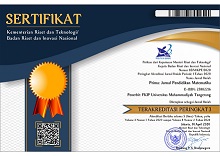MATHEMATICAL COMMUNICATION ABILITY IN SOLVING SQUARE FUNCTION QUESTIONS VIEWED FROM STUDENTS' LEARNING INTERESTS
Abstract
Keywords
Full Text:
PDFReferences
Anderson, J., & Smith, L. (2015). Effective Mathematics Communication in the Classroom. Journal of Mathematics Education, 12 (4), 234–250. https://doi.org/https://doi.org/10.1234/jme.2015.0012
Fauziah, & Desniarti. (2021). Analysis of Students' Mathematical Communication Abilities Through the Reciprocal Teaching Learning Model given Class VII Students' Interest in MTs Al-Ikhlasiyah . 8 (2), 256–271.
Haniyah, D., & Khusna, H. (2023). Math Anxiety As A Predictor Of Math Communication Ability In Senior High School STUDENTS. Prima: Journal of Mathematics Education, 7 (1), 77–88. https://doi.org/10.31000/prima.v7i1.7341
Hendriana, H., & Soemarmo, U. (2014). Mathematics Learning Assessment. Bandung Journal: PT Refika Aditama.
Hinton, P. R., McMurray, I., & Brownlow, C. (2016). SPSS Explained. Routledge.
Johnson, A. B. (2022). The role of visual representations in mathematics learning. Journal of Mathematics Education, 15 (2), 45–62.
Johnson, P. (2018). Motivation and Communication in Mathematics Education. Educational Psychology Review, 30 (1), 45–60. https://doi.org/https://doi.org/10.1007/s10648-018-9442-x
Lestari, EK, & Yudhanergara, RM (2019). Mathematics Education Research. PT: Refika Aditama.
Nahdi, DS (2019). Mathematical Skills in the 21st Century. Cakrawala Pendas Journal , 5 (2), 133–140.
NCTM. (2000). Principles Standards and for School Mathematics.
Ningrum, IDA, Swastika, A., & Cahyo, AN (2024). The Effect of the PBL Model on Learning Outcomes Viewed from Mathematical Communication Ability of Students. Journal of Medicine: Journal of Mathematics Education IKIP Veteran Semarang, 8 (1), 30–39. https://doi.org/10.31331/medicivesveteran.v8i1.2722
Nur'aini, T. (2022). Analysis of Students' Mathematical Communication Skills in terms of SMP/MTS students' learning interest in Set Material. Sultan Syarif Kasim Riau State Islamic University.
Nurhasanah, RA, Waluya, SB, & Kharisudin, I. (2019). Mathematical Communication Skills in Solving Story Problems. Proceedings of the UNNES National Postgraduate Seminar NATIONAL POSTGRADUATE SEMINAR.
OECD. (2019). PISA 2018 Results (Volume I) What Students Know and Can Do. OECD Publishing. https://doi.org/10.1787/5f07c754-en
Minister of Education and Culture Regulation. (2016). Minister of Education and Culture Regulation Number 21 of 2016.
Swastika, A. (2016). Developing Mathematical Communication Skills Through the Teams Games Tournament (TGT) Type Cooperative Learning Model using the Jingling Button Technique. UNY National Seminar on Mathematics and Mathematics Education, pp. 241–246.
Yulianto, H., & Suprihatiningsih, S. (2019). Students' Mathematical Communication Skills in Treffinger Learning Based on Self-Efficacy.
DOI: http://dx.doi.org/10.31000/prima.v8i3.12290
Article Metrics
Abstract - 295 PDF - 203Refbacks
- There are currently no refbacks.
Prima: Jurnal Pendidikan Matematika
Program Studi Pendidikan Matematika
Fakultas Keguruan dan Ilmu Pendidikan
Universitas Muhammadiyah Tangerang
Jl. Perintis Kemerdekaan I/33, Cikokol
Kota Tangerang, Indonesia
e-mail: primajpm@gmail.com
Prima: Jurnal Pendidikan Matematika (p-ISSN: 2579-9827 | e-ISSN: 2580-2216) is licensed under a Creative Commons Attribution 4.0 International License.







